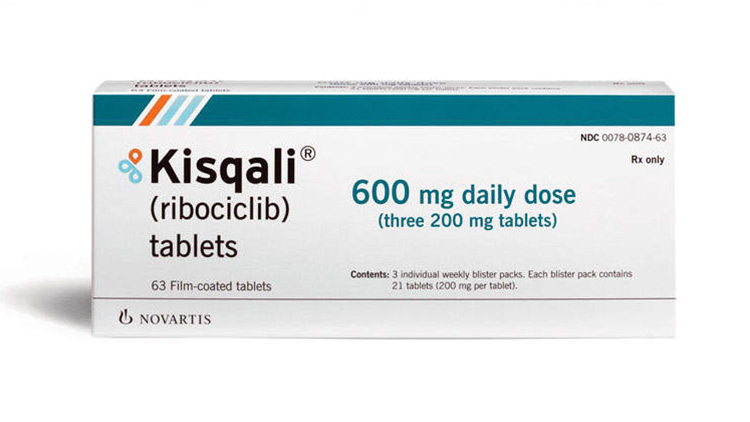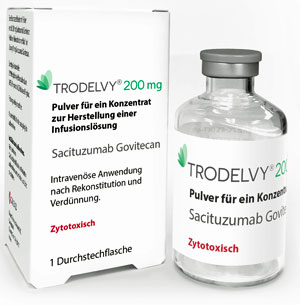Kisqali (ribociclib) vs Trodelvy (sacituzumab govitecan-hziy)
Kisqali (ribociclib) vs Trodelvy (sacituzumab govitecan-hziy)
Kisqali (ribociclib) is a CDK4/6 inhibitor used in combination with hormone therapy for the treatment of HR-positive, HER2-negative advanced or metastatic breast cancer, primarily in postmenopausal women. Trodelvy (sacituzumab govitecan-hziy), on the other hand, is an antibody-drug conjugate specifically indicated for the treatment of metastatic triple-negative breast cancer (TNBC) after at least two prior therapies for metastatic disease. The choice between Kisqali and Trodelvy would depend on the specific subtype of breast cancer a patient has, as well as their previous treatments, with Kisqali being more suitable for HR-positive, HER2-negative breast cancers and Trodelvy being an option for patients with TNBC.
Difference between Kisqali and Trodelvy
| Metric | Kisqali (ribociclib) | Trodelvy (sacituzumab govitecan-hziy) |
|---|---|---|
| Generic name | Ribociclib | Sacituzumab govitecan-hziy |
| Indications | Hormone receptor-positive, HER2-negative advanced or metastatic breast cancer | Metastatic triple-negative breast cancer (mTNBC), urothelial cancer |
| Mechanism of action | CDK4/6 inhibitor, halts cell division in cancer cells | Antibody-drug conjugate, delivers cytotoxic drug to cancer cells |
| Brand names | Kisqali | Trodelvy |
| Administrative route | Oral | Intravenous |
| Side effects | Neutropenia, nausea, infections, fatigue, diarrhea | Neutropenia, diarrhea, nausea, fatigue, anemia |
| Contraindications | QT prolongation, liver impairment, hypersensitivity to ribociclib | Severe hypersensitivity to sacituzumab govitecan-hziy |
| Drug class | CDK4/6 inhibitor | Antibody-drug conjugate |
| Manufacturer | Novartis | Gilead Sciences, Inc. |
Efficacy
Kisqali (Ribociclib) Efficacy in Breast Cancer
Kisqali (ribociclib) is a prescription medication that is used for the treatment of certain types of breast cancer. Specifically, it is indicated for the treatment of hormone receptor-positive (HR+), human epidermal growth factor receptor 2-negative (HER2-) advanced or metastatic breast cancer. Ribociclib is often used in combination with an aromatase inhibitor as initial endocrine-based therapy in postmenopausal women or in premenopausal women in conjunction with ovarian suppression. The efficacy of Kisqali was demonstrated in several clinical trials, including the MONALEESA trials, which showed a significant improvement in progression-free survival when ribociclib was added to letrozole or fulvestrant compared to the use of these endocrine therapies alone.
In the MONALEESA-2 trial, for example, the combination of ribociclib and letrozole significantly extended progression-free survival compared to placebo plus letrozole in postmenopausal women with HR+/HER2- advanced breast cancer. The trial results indicated that patients receiving the combination therapy had a 44% lower risk of disease progression or death. These findings have established ribociclib as a valuable treatment option in the management of HR+/HER2- advanced breast cancer, offering patients a chance to control the disease for a longer period.
Trodelvy (Sacituzumab Govitecan-hziy) Efficacy in Breast Cancer
Trodelvy (sacituzumab govitecan-hziy) is another medication used in the treatment of breast cancer, specifically for adult patients with unresectable locally advanced or metastatic triple-negative breast cancer (TNBC) who have received two or more prior systemic therapies, at least one of them for metastatic disease. Sacituzumab govitecan-hziy is a Trop-2-directed antibody and topoisomerase inhibitor conjugate, which means it works by delivering a chemotherapy drug directly to the cancer cells. The efficacy of Trodelvy was evaluated in a study known as the ASCENT trial, which demonstrated a significant improvement in overall survival and progression-free survival for patients treated with sacituzumab govitecan-hziy compared to those who received standard chemotherapy.
In the ASCENT trial, patients receiving Trodelvy had a median overall survival of 12.1 months compared to 6.7 months for patients on chemotherapy, representing a 52% reduction in the risk of death. Moreover, the median progression-free survival was 5.6 months for patients treated with Trodelvy, compared to 1.7 months for those on chemotherapy. These results highlight the potential of Trodelvy to offer a meaningful clinical benefit in a patient population with a historically poor prognosis and limited treatment options. Trodelvy has thus become an important therapeutic option for patients with previously treated metastatic TNBC.
Regulatory Agency Approvals
Kisqali
-
European Medical Agency (EMA), European Union

-
Food and Drug Administration (FDA), USA

-
Health Canada

-
Therapeutic Goods Administration (TGA), Australia

-
Medsafe (NZ)

Trodelvy
-
European Medical Agency (EMA), European Union

-
Food and Drug Administration (FDA), USA

Access Kisqali or Trodelvy today
If Kisqali or Trodelvy are not approved or available in your country (e.g. due to supply issues), you can access them via Everyone.org.
How it works

Make an enquiry
Choose the medicine you want to buy, answer a couple of questions, and upload your prescription to speed things up. We’ll get back to you within 24 hours.


Make an enquiry
Choose the medicine you want to buy, answer a couple of questions, and upload your prescription to speed things up. We’ll get back to you within 24 hours.


Breeze through the paperwork
We'll guide you through the required documents for importing unapproved medicine, ensuring you have all the necessary information.


Get a personalized quote
We’ll prepare a quote for you, including medicine costs and any shipping, administrative, or import fees that may apply.


Receive your medicine
Accept the quote and we’ll handle the rest - sourcing and safely delivering your medicine.

Some text on this page has been automatically generated. Speak to your physician before you start a new treatment or medication.
Let's talk
If you have any questions, call us or send us a message through WhatsApp or email:
Contact us




